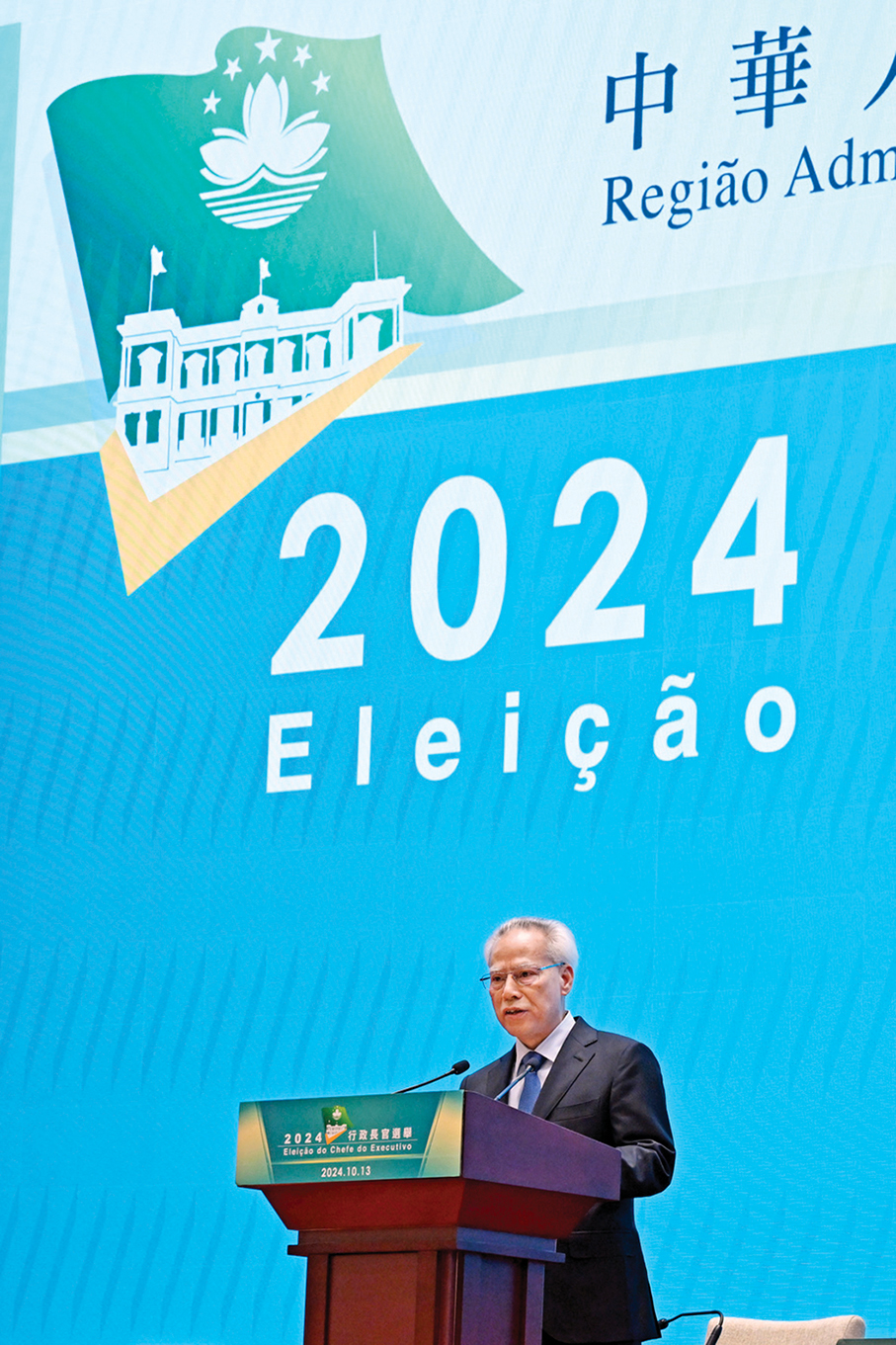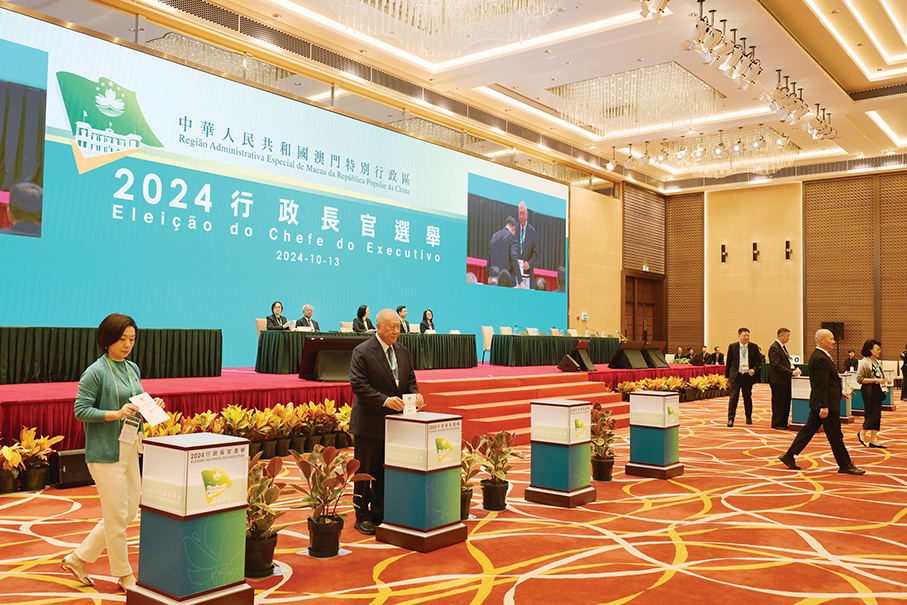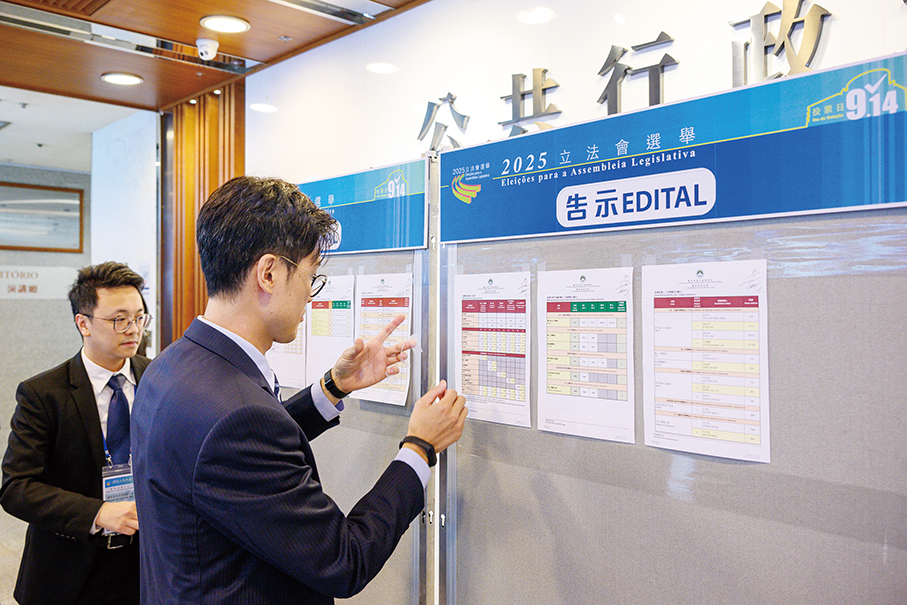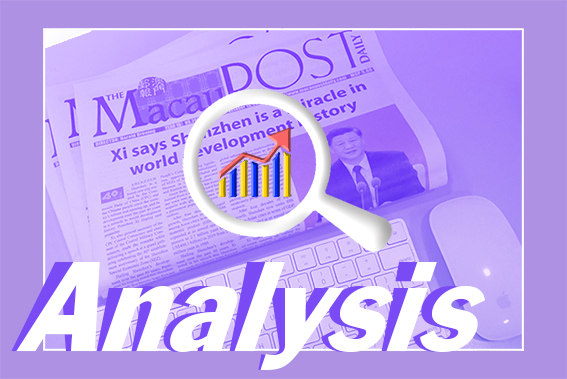Chief Executive-elect Sam Hou Fai yesterday pledged to build a “capable” government which will adopt a “proactive” approach to Macau’s economic development as well as to make greater contributions to national development.
Sam made the remarks during a press conference after his resounding election victory.
The election of the sixth-term chief executive of the Macau Special Administrative Region (MSAR) was held at the Services Platform Complex for Commercial and Trade Cooperation between China and Portuguese-speaking Countries (aka Forum Macao Complex) yesterday morning, where Sam, the sole candidate, garnered 394 of the 398 votes cast by the 400-member Chief Executive Election Committee, or 98.99 percent of the ballots cast, with two electors absent.
There were four blank and no invalid votes.
In the previous election in 2019 when all 400 members of the election committee attended, now-outgoing Chief Executive Ho Iat Seng was elected by 392 of them, or 98 percent of the votes cast.
Sam, the former president of the Court of Final Appeal (TUI) will be sworn in as the MSAR’s sixth-term and fourth chief executive on December 20, the 25th anniversary of Macau’s return to the motherland.
Macau’s first and second chief executive, Edmund Ho Hau Wah and Fernando Chui Sai On, each served two consecutive five-year terms, the maximum allowed under the MSAR Basic Law.
Ho Iat Seng announced on August 21 that for health reasons he was not seeking a second five-year term.
During yesterday’s post-election press conference, which was also held at the Forum Macao Complex, located near Macau Tower, Sam was asked how he and his future government would tackle the various issues in civil society by studying the opinions and suggestions gathered during his election campaign.
Sam said that after he announced his decision to run for chief executive in late August, during a period lasting less than 50 days consisting of the candidacy nomination period, a period preparing his election campaign manifesto, and the campaign period, he visited or met with 108 community associations, involving 2,194 residents from various segments of civil society. During the period, Sam said, his election campaign office gathered over 2,200 opinions or suggestions, which, he said, will be very helpful for him to set up his administration after he is appointed as the MSAR’s head of government by the State Council in Beijing in the near future.
Sam announced his chief executive candidacy on August 28. The nomination period ran between August 29 and September 12, during which only Sam submitted his candidacy nomination form. Afterwards, his candidature application was reviewed and approved by the Chief Executive Electoral Affairs Commission (CAECE) before the election campaign period started on September 28 and ended on Friday last week.
Sam said during yesterday’s press conference that his future government will set up new mechanisms and channels for regular meetings or exchanges between senior officials and local patriotic community associations.
Sam noted that during his election campaign period, he went on five walkabouts in different neighbourhoods across the city, namely Iao Hon district, San Kio district, Inner Harbour area, central Taipa, and Coloane’s Seac Pai Van, where some views and opinions raised by residents whom he met triggered “very deep feelings” in him.
Sam went on to say that the views raised by residents during his walkabouts and raised by community associations and organisations which he met have enabled him to summarise three points that Macau’s civil society wants his future government to place special emphasis on.
Sam raises 3 points
Firstly, Sam said, civil society agrees that the local government must fully implement the principles of “One Country, Two Systems”, “Macau people governing Macau”, and the MSAR’s high degree of autonomy, while fully complying with the correct relationship between the central authorities’ overall jurisdiction over the MSAR and the MSAR’s high degree of autonomy.
Secondly, Sam said, civil society wants a “capable and proactive” government, adding that it is wrong to say that the local government can only assume a “limited and passive” role in performing its duties and functions because of the fact that Macau has adopted the capitalist system.
Sam said that residents want the government to assume a proactive role in its administration, which will strengthen coordination between different public entities, pledging that his future government will create favourable conditions aiming to improve the city’s business environment, boosting community businesses, and supporting local small- and medium-sized enterprises (SMEs).
Thirdly, Sam said, residents want his future government to improve the population’s well-being in various aspects such as education, healthcare, transport, and senior citizens’ retirement
Sam pledged that when he forms his government, he will categorise and study residents’ opinions with his team members with the aim of concluding which of them could be tackled and solved in the short or medium terms.
During yesterday’s press conference, which lasted 35 minutes, Sam also underlined the need for Macau to better integrate its development into the nation’s overall development, reaffirming that Macau should give full play to its unique advantages with the aim of promoting its own development while also supporting the nation’s development.
Sam underlined the need for Macau to make its own contributions to the nation’s cause of building a strong country and moving towards national rejuvenation.
During the press conference, Sam also pledged that his administration will speed up the Iao Hon Estate redevelopment project, which would become an example encouraging residents living in other old neighbourhoods to work with the government to redevelop their dilapidated buildings.
Sam also said that the changes in consumption habits and patterns of both residents and tourists alike, an issue that local small- and medium-sized enterprises (SMEs) are facing, are expected to become a long-term phenomenon, adding that his administration will encourage local businesses to change their entrepreneurship concepts and make good use of online marketing.
According to the Chief Executive Election Law, in order to be elected, a chief executive candidate must obtain over half of the votes of the members of the 400-strong Chief Executive Election Committee, i.e., at least 201 votes.
Sam, 62, was born in Zhongshan City, some 40 kilometres north of Macau in Guangdong Province, making him the first Macau chief executive born in the mainland. He graduated from Peking University’s law school and moved to Macau in 1986.
‘Highest honour of my life’
In his acceptance speech after being elected, Sam described the victory as the highest honour of his life, saying that he was both humbled and excited. He said that he is fully prepared to devote himself to serving the city that he “deeply loves”.
“Right now, Macau is welcoming the best period of its development. Let’s grasp the opportunities and meet the challenges, work hard together and reform. We strive for development and prosperity, and build our homes in a better way together,” Sam said.
Sam also said that Macau would contribute with its full strength to national rejuvenation and the building of a strong nation. “I stand here today [yesterday] full of emotions. Because my life’s path has always shared the same fate as the country, and Macau.”
Sam pledged that he will unswervingly uphold the “One Country, Two Systems” principle, safeguard the nation’s sovereignty, security and development interests, and promote Macau’s appropriate economic diversification.

Chief Executive-elect Sam Hou Fai delivers his acceptance speech to members of the Chief Executive Election Committee at the Forum Macao Complex. – Photo: GCS

Chief Executive-elect Sam Hou Fai addresses yesterday’s press conference following his election as Macau’s sixth-term and fourth chief executive at the Forum Macao Complex. – Photo: Tony Wong

Several Chief Executive Election Committee members, including Chinese People’s Political Consultative Conference (CPPCC) National Committee Vice Chairman Edmund Ho Hau Wah, Macau’s first chief executive (second from left), cast their ballots during yesterday’s chief executive election at the Forum Macao Complex. – Photo: GCS








